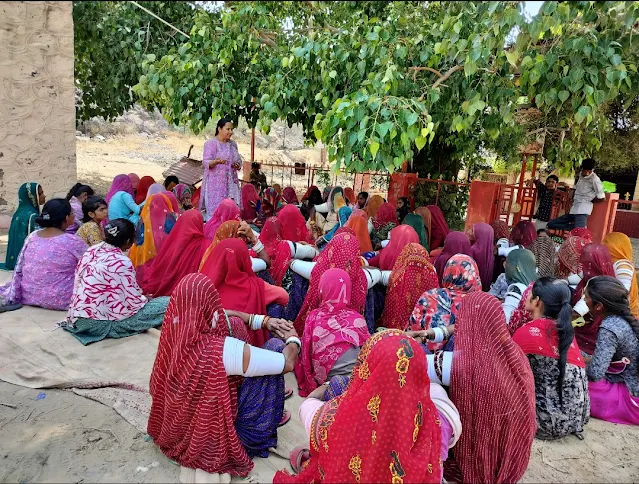An unjust aspect of rural society in India that often goes unnoticed is the discrimination faced by widows. Although as far as the legal position is concerned they have completely equal social rights and in fact any discrimination against them would be illegal, yet the weight of tradition hangs heavy in many villages and what happens in actual practice goes more by tradition.
According to traditional practices followed in several (but not all) parts of rural India, widows are frowned upon if they wear any colorful dress, particularly the more bright and lively colors like red, pink etc. One cannot say that this is forbidden, but tradition hangs so heavy in many villages that rather than invoke the anger or criticism of family members and neighbors, widows tend more often to simply follow this tradition without challenging its injustice. Considering that several marriages take place at quite at a very young age, there can be several young or relatively young widows also and they are supposed to stay away from colorful and lively dress for the rest of their life. Clearly this is very unjust for any widow and all the more so for the younger ones.
What is more, this is not just a matter of dress alone. This is rather the more outward symbol of various restrictions which a widow has to endure in silence. Another part of discrimination is that widows are discouraged from attending several social ceremonies as their presence is not considered to be auspicious by several persons. The combined result of all this can be quite depressive, and this is something that rural society should be able to avoid.
Keeping in view the urgency of changing such discriminative practices, the Mahila Sangathan or women’s organization in Barmer district of Rajasthan state has been carrying out a campaign to end this discrimination. This region is a part of the great Thar desert where houses tend to be more distant and scattered and hence possibilities of daily inter-actions with several neighbors are much lesser. Hence the feeling of seclusion and discrimination taken together can be even more distressing.
Recognizing this reality of the life of widows and the need for changing this dismal and unjust situation, in its various meetings this organization started emphasizing the importance of according equal status to widows not only in terms of law but also in terms of daily life at village and family level.
As women at various meetings started discussing this issue, they realized that perhaps unwittingly and unintentionally, tending to behave in terms of established traditions and practices, even some women may be encouraging this practice if they are not aware of the need for taking deliberate steps for asserting equality for widows in real life conditions.
From these discussions an idea was born that as a symbolic act that can send a message for social change in the entire community, at their meetings these women will openly and publicly dress widows in a colorful chunri, a shawl or stole type part of dress very commonly used by women in India. This small ceremony is being called chunri paravirtan (change of chunri). This has been widely appreciated by women and now there is much enthusiasm for such meetings. Nearly 115 widows have been dressed in this kind of more colorful chunris in such meetings, and this campaign is continuing.
At a recent such meeting in Gamrakh Dham, Anita Soni, coordinator of Mahila Sangthan said that legal and constitutional rights become meaningful for those who suffer from discrimination only when such efforts to change the real life situation are made. Karishma Makariya, a social activist said, that no stigma should be attached to the presence of widows in various social events and ceremonies and chunri parivartan (change of chunri) ceremony is also conveying this message.
In fact there is a need to carry forward such efforts in other ways also so that widows are able to protect their land and livelihood rights whenever these are threatened. In some other villages this writer noticed that when powerful persons tried to grab the land of widows, then sometimes they appeared very helpless in such conditions. Timely help in such difficult situations is very helpful for widows as they are often also bringing up small children.
While the Indian government has a special scheme of pension for widows, the pension amount is generally too small, even after state governments add their share to it. There is a clear need to raise the pension amount and to ensure that this reaches all widows who need this pension. In the more remote villages in particular, such as those in the desert areas of Rajasthan, widows often need help of officials or of voluntary organizations to access such help, and such assistance should be available to them.
---
The writer has reported extensively on development and social reform issues. His recent books include When the Two Streams Met, Man over Machine, and A Day in 2071


Comments